Women have always been at the forefront of efforts to improve society and combat injustice in Myanmar.
In the early 20th century when the country was under British rule, women were an important part of the nationalist movement that culminated in the restoration of Myanmar’s independence in 1948.
In recent history, women from all spheres, from students to professionals and housewives have played a huge part in the struggle for democracy, many paying a high cost for their efforts, including spending long periods in jail.
Over the past three years since the nominally civilian government has opened the country up to an extent, women’s participation in public life has become ever more visible.
From the arts to sports, media, movies, education, labor, and business, to mention only a few areas, women are making a mark and inspiring others to follow in their footsteps.
As lawmakers, media workers, humanitarians and rights defenders, women from every corner of the country are addressing some of the country’s deepest and most difficult challenges.
Some of this work will be acknowledged and discussed at the second Women’s Forum taking place in Naypyitaw and Yangon on Friday and Saturday Dec. 5-6.
Below, as women’s contributions continue to achieve ever-increasing recognition, we highlight just a few outstanding individuals whose hard work, courage and vision make them powerful agents of change in the effort to achieve a democratic and prosperous Myanmar.
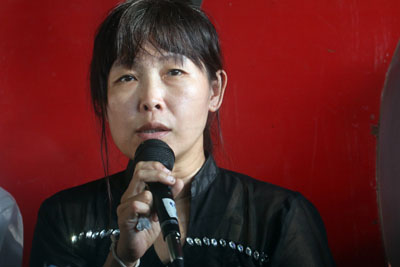
Searching for Truth
After her husband was killed, Ma Thandar called for justice and the rule of law.
In October, Ma Thandar was in Bangkok to receive a United Nations-sponsored award for her work on democracy and peace when she learned that her journalist husband had been shot dead by the Myanmar Army.
From the Thai capital to the conflict-torn fields of Mon State where Ko Aung Kyaw Naing, better known as Ko Par Gyi, met an untimely death was a distance of just a few hundred miles, but many worlds away.
Ma Thandar’s subsequent dignified calls for justice for her husband spoke to the aspirations of the many in Myanmar long frustrated over the lack of rule of law and the gap between the promise and the delivery of reforms.
Her earlier call for answers after Ko Par Gyi went missing while covering clashes between the Tatmadaw and Kayin fighters had impelled some in the army to make an unprecedented statement admitting the journalist had been shot in custody.
Now she hopes that out of her loss may come something better. “If justice can be done for my husband, the truth may also be revealed for others who were killed unnoticed like him, and we can prevent this from being repeated. Please help me.” —Kyaw Phyo Tha
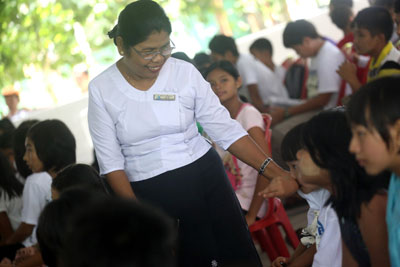
Standards-Bearer
In death everyone deserves dignity, insists Daw Than Myint Aung.
The belief that a decent society should ensure everyone a proper burial inspired Daw Than Myint Aung to co-found the Free Funeral Service Society in 2001.
Since then she has helped provide the coffins and dignified burial of thousands of people, and she also began lending a shoulder to bereaved elderly people left behind in dire straits.
In 2010 she founded the Twilight Villa (See Zar Yeik) home, which provides for some 70 elderly people with no other means of support.
The prolific, award-winning writer whose works illuminate the plight of the poor and suffering also co-founded the Thukha Yeik Myone orphanage, which cares for over 100 children with HIV.
This year she was honored with a Citizen of Burma Award from the US-based organization of the same name. —Yen Snaing
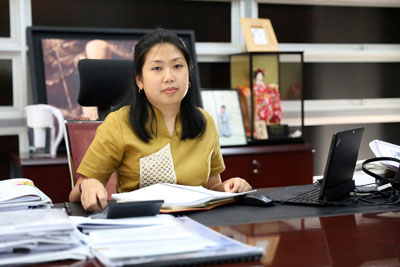
Business Smarts
Ma Win Win Tint helps modernize Myanmar.
If supermarkets and convenience stores are some of the most obvious emblems of 21st century living, Ma Win Win Tint has to be one of Myanmar’s most visible modernizers.
The entrepreneur started the City Mart chain of supermarkets in 1996 and struggled for years to overcome innumerable challenges, including a natural disaster and a bomb blast. She now runs more than 15 large outlets including hypermarkets in Yangon, Mandalay and Naypyitaw.
A new brand of City Express convenience stores has been expanding in Yangon since 2012. The group, which employs more than 4,000 people, also runs bakeries, pharmacies and baby stores.
This year Ma Win Win Tint was runner-up in the Women Entrepreneur Award of the 2014 Asean Business Awards.
“We were recognized at the Asean level for our hard work. Now, we’re continuing to try and open new branches as well as to improve our quality and services to give customer satisfaction,” she said. —Zarni Mann
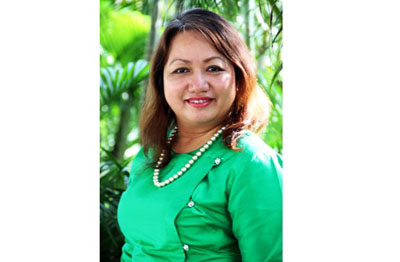
Busting the Glass Ceiling
Ma May Myat Mon Win gives a five-star performance.
As the first Myanmar female general manager in the country’s high-end hotel industry, Ma May Myat Mon Win is breaking new ground.
Her appointment to the position of general manager at Yangon’s five-star Chatrium Hotel this year encourages other locals, both men and women, to set their sights on leadership positions in the prestigious sector.
“If others can do it, why can’t we?” asked Ma May Myat Mon Win, who has around 20 years’ experience in sales, marketing and hospitality management.
“We just need the commitment. There are many talented Myanmar people out there ready to take on challenges and responsibilities.” —Zarni Mann
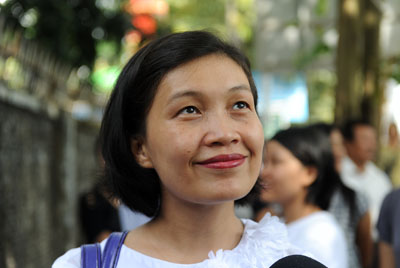
Peacemaker
Violence must end, says Ma May Sabe Phyu.
After the government army and the Kachin Independence Army (KIA) resumed fighting in 2011 and thousands of civilians were among the first to suffer, Ma May Sabe Phyu co-founded the Kachin Peace Network and the Kachin Women’s Peace Network.
Her goal—to raise awareness about the troubled north and promote peace-building—ran into trouble in 2012 after she led a march calling for peace and was charged in six townships under the Peaceful Assembly Law for doing so.
In her other role as director of the Gender Equality Network, the activist has been working on the country’s first legislation to tackle violence against women, due to be completed before the end of the year.
“The peace that I seek is not only about the end of civil wars, but also the end of violence against women. Without this, we can’t say it’s true peace,” she said. —San Yamin Aung
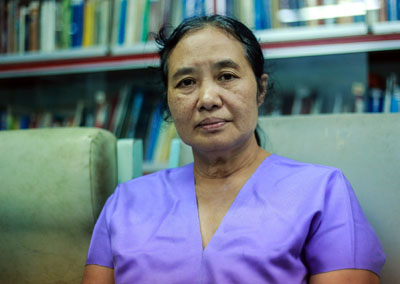
Saving the Sick
Dr. Cynthia Maung stays the course for more than a quarter-century.
Dr. Cynthia Maung, the physician who is often described as Myanmar’s Mother Teresa, continues her lifesaving work at the Mae Tao clinic she founded in 1988 in the Thai frontier town of Mae Sot.
The clinic provides free treatment to more than 100,000 people every year from the nearby migrant and refugee communities and from all around Myanmar.
Born to an ethnic Karen family in Moulmein in 1959, Dr. Cynthia studied medicine at the University of Yangon. She left Myanmar after the army conducted a bloody crackdown against democracy advocates in 1988.
Dr. Cynthia is the winner of numerous awards, including Asia’s prestigious Ramon Magsaysay award in 2002. In December last year, Thailand’s Princess Maha Chakri Sirindhorn presented her with an honorary doctorate in medicine from Ubon Ratchathani University. In 2013, the Sydney Peace Prize Foundation awarded her their annual Sydney Peace Prize.
Though the demand for services is as high as ever, the Mae Tao clinic has been hit since 2012 by donors opting to re-channel monies inside Myanmar instead of to its needy border areas. —Saw Yan Naing
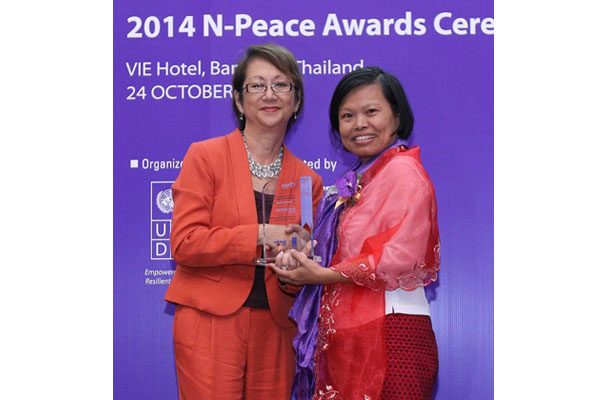
Lifting Lives
Mi Kun Chan Non promotes empowerment from the ground up.
Myanmar’s borders are home to some of the country’s most neglected populations and women there often experience even more exclusion than marginalized men.
Mi Kun Chan Non has worked for many years to impart Mon women living on the border with Thailand and in other areas with the skills and confidence to take the lead on issues affecting them.
This year the vice chairwoman of the Mon Women’s Organization won a United Nations Development Programme-sponsored N-Peace Award for her long commitment to women’s empowerment.
Mi Kun Chan Non was also one of the few female observers during ceasefire talks between the government and the New Mon State Party in 2012. She continues to call for a far greater role for women in the peace process.
A former teacher and adviser to the Mon National Education Committee, she successfully promoted the teaching of the Mon language in some schools in Mon State, where the government curricula are in the Myanmar language.
“Women’s participation in decision-making is still rather unclear. We believe this is something that must move on,’’ she said. —Nobel Zaw.
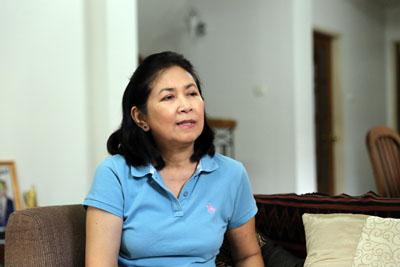
The Write Stuff
Daw Aye Aye Win’s way with words.
In the early days of her journalism career, Daw Aye Aye Win was harassed on numerous occasions by the authorities.
Once labeled a “stooge of the foreign press” by Myanmar’s state-run media, she was long on the government watch-list as she worked for a foreign news agency, The Associated Press.
Twenty-five years later, she is the only living woman journalist in Myanmar to win four major journalism awards. One award quoted her “life-long dedication to honest and courageous journalism, often at the risk of personal safety.”
When she began her journalism career, she was the only female journalist working for an international agency in the country. Some people were scornful of her position, saying she got the job thanks to her father, a former AP correspondent.
“I vowed to myself to prove to them I could be a journalist,” the 60-year-old recalled.
More than two decades later, nobody can deny she has made it. —Kyaw Phyo Tha
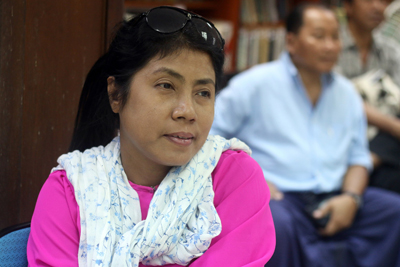
Law-Maker
Daw Nyo Nyo Thin speaks out in Yangon’s regional parliament.
The independent lawmaker representing Bahan Township in the Yangon Region parliament is fast becoming a role model for young women aspiring to leadership positions in public life.
One of just six women among the parliament’s 123 MPs, Daw Nyo Nyo Thin is proving to be an outspoken member on women’s empowerment and development issues. She spoke out against the controversial Yangon City Expansion Project which, in a rare victory, was shelved after a public outcry over corruption claims raised by parliamentarians and the media.
Formerly unknown in public life, Daw Nyo Nyo Thin believes “women are much more qualified than people think.”
She supports a quota system of at least 30 percent female participation in the three branches of government.
In Myanmar, she added, “women are not favored by the [political] system, and their weakness is that they are not interested in taking [leadership] positions but instead are ready to serve others.”
Prior to 2010 she earned a doctorate in law at the Yokohama National University in Japan and pursued postdoctoral studies at the Peace and Governance Program in Tokyo’s United Nations University. —Nyein Nyein
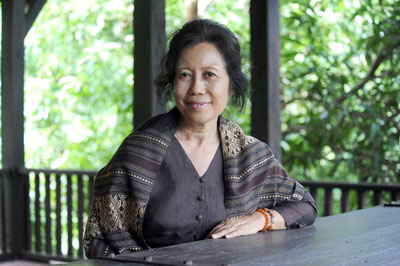
Seeing Potential
For Lahpai Seng Raw, change happens at the grassroots.
The ethnic Kachin and leading humanitarian was the winner of the 2013 Ramon Magsaysay prize, Asia’s highest honor in the mold of Europe’s Nobel Prize awards.
As co-founder of the Metta Development Foundation, Myanmar’s largest civil society organization, Lahpai Seng Raw believes strongly in the power of civil society groups to effect social change.
The 65-year-old widow has dedicated her life to empowering marginalized communities. She has worked in the humanitarian field for almost three decades, providing community development in ethnic areas and support to displaced people in conflict-torn regions.
The former stay-at-home mother turned social worker is today a leading role model for youth and especially for women. Due to what has been described as her “inclusive and selfless” leadership, she has earned wide recognition at home and abroad. —Nyein Nyein
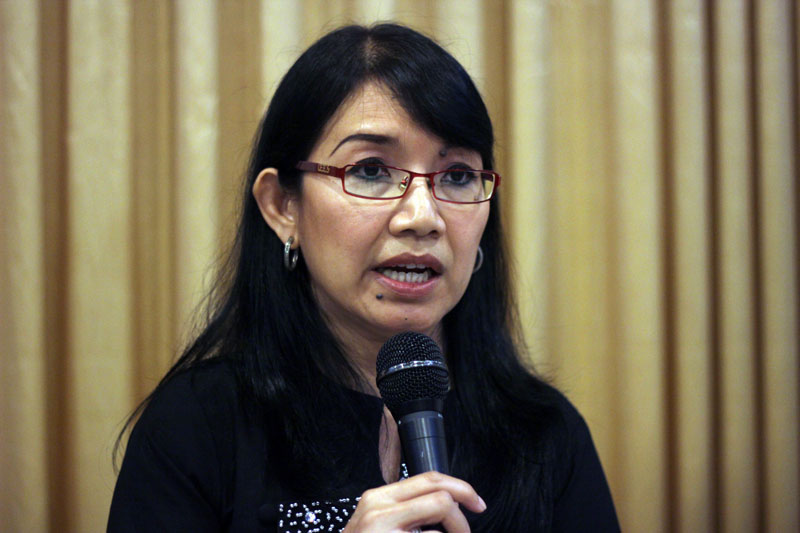
Advocating for Rights
Daw Khin Ohmar pushes the primacy of human rights.
A leader at the human rights advocacy group Burma Partnership, Daw Khin Ohmar believes that “genuine change in Myanmar will depend on the people” rather than on political figures.
As a veteran of more than two decades working within the movement for democracy and human rights in Myanmar, Khin Ohmar is a well-known expert and critic on key justice and rights challenges facing the country today.
She also acts in an advisory role to the Women’s League of Burma, an alliance of ethnic women’s organizations based in Thailand.
Though permitted to travel to Myanmar since President U Thein Sein welcomed exiled activists to return, she said she still feels “uneasy’’ about working in the country. “The regime is still not able to change their attitude and mindset toward criticism.” —Nyein Nyein
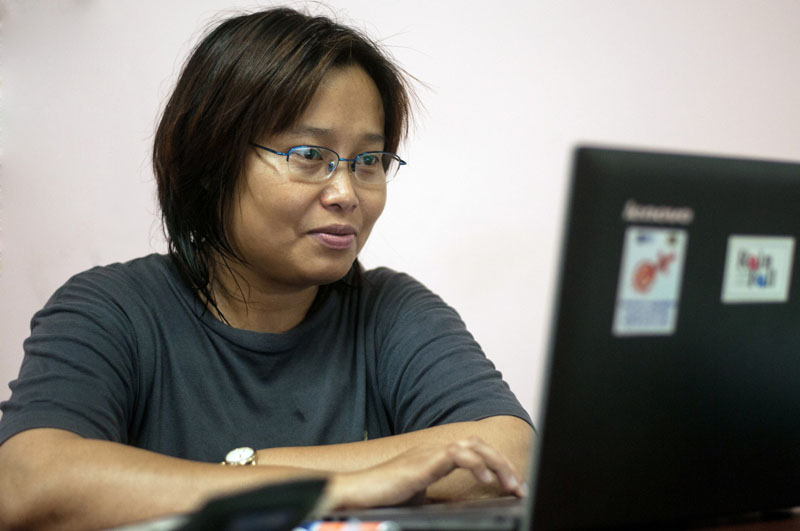
Freedom to Choose
Ma Zin Mar Aung calls for tolerance, receives the opposite.
Ma Zin Mar Aung was only keeping faith with her beliefs concerning tolerance and freedom of choice for women when she spoke out against a controversial proposed law restricting interfaith marriages. But in return, extreme nationalists sent her death threats and hate mail.
The law, proposed by a group of monks, would require Buddhist women to seek permission from their parents and authorities before marrying a man of another faith, who would be forced to convert to Buddhism.
“The proposal was unacceptable because it was based on extreme nationalism and religious extremism. It interfered with individual freedoms and particularly with the personal choices of women,” she said.
Ma Zin Mar Aung was selected as an International Woman of Courage in 2012 and as one of the Young Global Leaders at the World Economic Forum in 2014.
The former political prisoner is a co-founder of the Yangon School of Political Science and has since founded an organization titled Rainfall to encourage greater women’s participation as the country moves toward democracy. —San Yamin Aung
This story first appeared in the December 2014 issue of The Irrawaddy magazine.

















